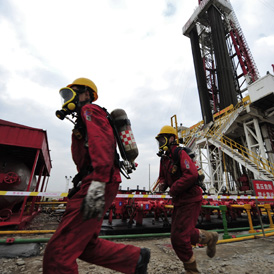France votes to ban shale gas drilling
The French parliament has become the first to vote for a ban on a controversial new technique for extracting natural gas, amid concerns about environmental pollution.

The French parliament has become the first to vote for a ban on a controversial new technique for extracting natural gas, amid concerns about environmental pollution.
New technology allows energy companies to access gas resources previously thought to be beyond reach, trapped in shale rocks deep beneath the surface.
Shale gas is a massive industry in the US where it supplies around 25 per cent of the country’s gas demand – and exploration has begun across the rest of the world, including Britain – as reported last year on Channel 4 News.
But the drilling process is increasingly controversial. The shale rocks have to be broken up by pumping a mix of water, sand and chemicals down into the gas wells under high pressure, a process known as hydraulic fracturing.
Many of the chemicals used in the fracturing process are highly toxic, and the US industry has been accused of allowing them to leak into the water supply.
Read more: a new energy source for Britain?
There have also been reported incidents of methane gas leaking into water supplies, leading to alarming incidents of tap water catching fire.
Amid these environmental concerns, the French parliament today voted overwhelmingly in favour of a motion to ban hydraulic fracturing, by 287 votes to 186. France is believed to be one of the most promising territories for shale gas drilling in Europe, with extensive deposits in the south and in the area near Paris.
However, the country has seen widespread protests against shale gas drilling. The anti-globalisation campaigner José Bové and Danielle Mitterand, the wife of the former president, are among the high profile figures calling for a ban.
The bill for a ban now passes to the Upper House of the French parliament, the Senate, which will debate the measure on June 1.
The news is a blow to energy companies, which are hoping to exploit shale gas resources across Europe. The French Union of Petroleum Industries said that it “strongly regretted” the decision.
Environmental campaigners, however, are not united in their condemnation of shale gas drilling. Some, such as the WorldWatch Institute in Washington, have argued that shale gas could help to reduce global greenhouse gas emissions because, when burned, it produces lower carbon dioxide emissions than coal.
Follow Ben King on Twitter @kumquatkid